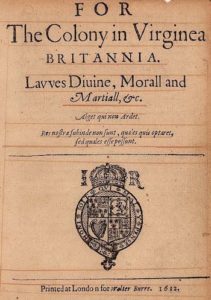
*The Virginia Company of London was chartered on this date in 1606. This was a slave-trading business and refers collectively to two joint-stock companies.
They were chartered during the middle passage under James I of England to establish settlements on the coast of North America. The two companies are referred to as the "Virginia Company of London" (or the London Company) and the "Virginia Company of Plymouth" (or the Plymouth Company), and they operated with identical charters in different territories. The charters established an area of overlapping territory in North America as a buffer zone, and the two companies were not permitted to establish colonies within 100 miles of each other. The Plymouth Company never fulfilled its Charter, but England claimed its territory and became New England.
As corporations, the companies were empowered by the Crown to govern themselves. This right was passed on to the colony following the dissolution of the third Charter in 1621. The Virginia Company failed in 1624, but the right to self-government was not taken from the colony. Slavery in Virginia began with the capture and enslavement of Native Americans during the early days of the English Colony of Virginia and through the late eighteenth century. They primarily worked in tobacco fields. Africans were first brought to colonial Virginia in 1619 when 20 Africans from present-day Angola arrived in Virginia aboard the ship The White Lion.
As the slave trade grew, enslaved people generally were forced to labor at large plantations, where their free labor made plantation owners rich. Colonial Virginia became an amalgamation of Algonquin-speaking Native Americans, English, other Europeans, and West Africans, each bringing their language, customs, and rituals. By the eighteenth century, plantation owners were the aristocracy of Virginia. There was also a class of white people who oversaw the work of enslaved people and a poorer class of whites who competed for work with freed Africans. Tobacco was the key export of the colony in the seventeenth century.
Slave breeding and trading gradually became more lucrative than exporting tobacco during the eighteenth and nineteenth centuries. Black human beings were the most lucrative and profitable export from Virginia, and black women were bred to increase the number of enslaved people for the slave trade. In 1661, Virginia passed its first law allowing any free person the right to own slaves. The suppression and apprehension of runaway slave labor were the objects of 1672 legislation. Additional laws regarding the slavery of Africans were passed in the seventeenth century and codified into Virginia's first slave code in 1705.
Over time, laws increasingly denied more rights and opportunities for enslaved people and supported the interests of slaveholders. This principle was established that a royal colony should be self-governing, which is credited with forming the genesis of American democracy.